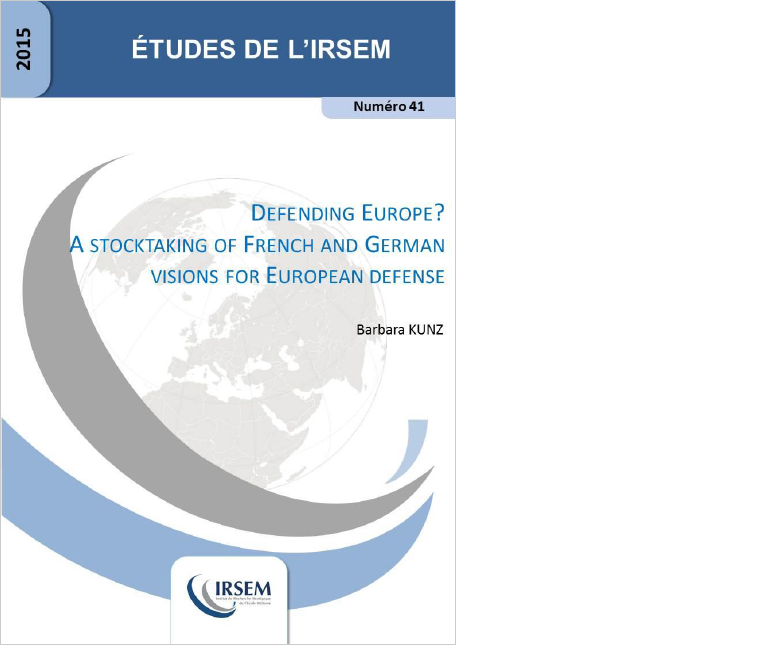German Foreign Policy
Faced with a fragmentation of the established order and an increasing number of crises, Germany is tending to reassess its position in a changing world.
France, Germany, and the Quest for European Strategic Autonomy: Franco-German Defence Cooperation in A New Era
How can France and Germany contribute to reaching the goal of European strategic autonomy? This key question has been guiding the work with the present report. In the light of a more demanding security environment, but also a rare momentum for further European integration, Berlin and Paris have to take their security and defense cooperation to the next level, bilaterally as well as in the EU.
Europe after the Brexit: German positions and perspectives
The British decision to leave the European Union comes at a critical moment for Germany and the EU. It exacerbates the “polycrisis” of recent years and leads to controversial questions: What should the EU look like without Great Britain? What is the objective, the “finality”, of European integration? And what role should Germany play in the future?
Humanitarian exploit or failure? The refugee crisis in Germany and Europe

The German Debate on Country’s Security: Different Discourse, Same Paradigm
Recent debates in Germany about the future of the country’s security and foreign policy have aroused interest abroad, especially in France.
The German OSCE Chairmanship in 2016: Towards a renewed dialogue with Russia?
The Organization for Security and Cooperation in Europe (OSCE) represents the perfect framework for discussion of pan-European security issues thanks to its unique composition - fifty-seven member states of the Euro-Atlantic sphere, including the United States and Russia. The OSCE remains indeed one of the few forums of institutionalized dialogue between Western countries and Moscow and the only one to also include Washington.
Islam, Judaism and National German Identity: Challenges and New Prospects
The present analysis links the debate on German national identity to on the one hand the revival of Judaism which was a deliberate political choice and on the other to the expansion of Islam which conversely was not anticipated. The article explains how Judaism was able to revive in Germany after 1945 and how Islam has become the third largest religion in the country in number of believers.
German Migration Policy: Unfinished Business
Although Germany is currently one of the main immigration countries, the Federal Republic has been slow to develop a long-term migration policy that comprehensively meets the diverse challenges that the country faces. Germany remains focused on short-term actions and is reacting to changes rather than actively anticipating them.

Defending Europe? A stocktaking of French and German Visions for European Defense
The aim of this study consists of taking stock of strategic thinking in France and Germany. More concretely, it intends to identify compatible and incompatible aspects, as well as the potential for compromise, in these national considerations on the future of CSDP and NATO. In so doing, it concentrates on five issues: strategic visions, threat perception and military doctrine; the institutional framework for European defense; military interventions; capabilities as well as the industrial dimension.

Tyskland - stormakt mot sin vilja?
In this article our research fellow Barbara Kunz summarises the broad outlines of German foreign policy to the Swedish public.
The “2014 Review”: Understanding the Pillars of German Foreign Policy and the Expectations of the Rest of the World
German foreign policy is today confronted with a number of fundamental challenges. The country has become larger and has again become strong economically and must no longer content itself with its former role as France’s political junior partner in Europe or the United States’ junior partner in the world. At the same time, Berlin is far from being fully prepared for taking over this new role – deficits are both strategic and conceptual.
Support independent French research
Ifri, a foundation recognized as being of public utility, relies largely on private donors – companies and individuals – to guarantee its sustainability and intellectual independence. Through their funding, donors help maintain the Institute's position among the world's leading think tanks. By benefiting from an internationally recognized network and expertise, donors refine their understanding of geopolitical risk and its consequences on global politics and the economy. In 2024, Ifri will support more than 70 French and foreign companies and organizations.

















